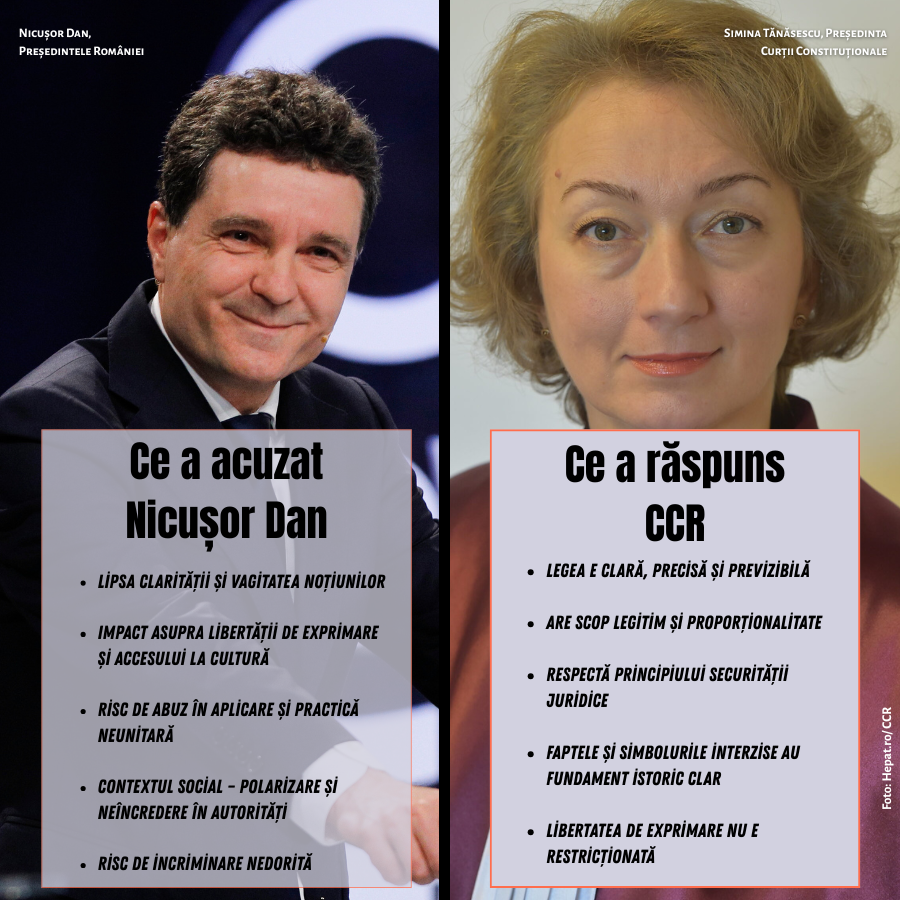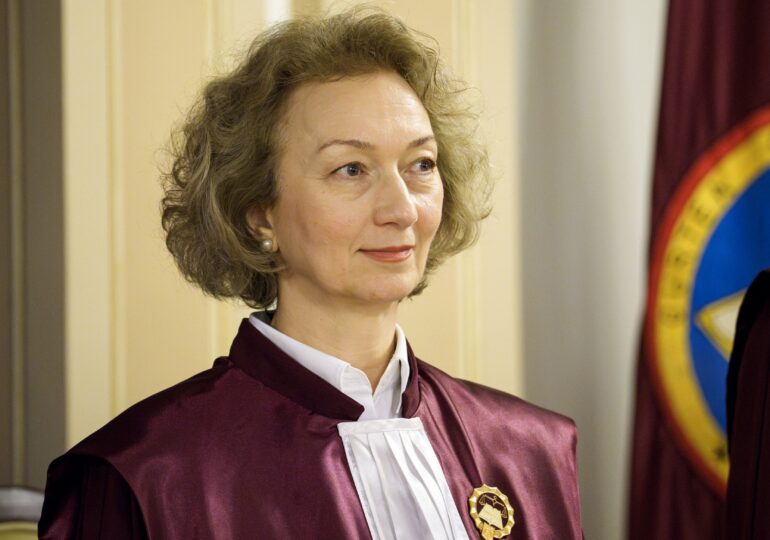The President records the second significant defeat since taking office. After a failed attempt to convince Ilie Bolojan, the Prime Minister of Romania, to find solutions to reduce the budget deficit without increasing the VAT, Nicușor Dan also lost to the new version of CCR, which unanimously voted to reject the President’s request for reexamination of the law banning political extremism.
In the first case, related to discussions around VAT, it was more about breaking a promise made during the election campaign, one that exceeded the president’s mandate, being an inability caused by the intensity of the electoral competition. In the second case, the defeat against the CCR was caused by an impulsive decision of Nicușor Dan, who confused the text of a law with that of a math problem.
„In the city of Făgăraș, there is a small association that promotes the Resistance in the Făgăraș Mountains, organizes exhibitions, various events of this kind. Among the members of the Resistance in the Făgăraș Mountains are a few individuals who in their past were part of the Legionary movement. The question is: does this association have a Legionary character? – because the law does not tell us,” said Nicușor Dan at a press conference held on Monday at the Cotroceni Palace.
"And if it has a Legionary character, should these people go to jail or not? - because the law tells us that if you found an association with a Legionary character, you must go to jail.
I believe not, I believe it is legitimate to promote the anti-communist Resistance in the Făgăraș Mountains. And there are many such ambiguities that leave room for arbitrariness.
Obviously, we need a law that condemns xenophobic, anti-Semitic, racist manifestations of any kind, without question, but such a law must be very clear, to avoid interpretations and potential abuses," added the President of Romania.
The unconstitutionality notification of the extremism law surprised a large part of the public opinion and provoked negative reactions from politicians, supporters of the regulation.

Notion of Legionary
Silviu Vexler, a deputy in the Romanian Parliament, representing our country's Jewish minority, harshly criticized Nicușor Dan for the decision to refer the matter to the CCR.
"The unconstitutionality notification made by the President of Romania is almost identical to the one made by the parliamentary groups of the S.O.S. Romania party, the Alliance for the Union of Romanians (AUR), and the Young People's Party (POT) and unaffiliated deputies, but much more harmful to the entire society," he wrote in a post on Facebook announcing his renunciation of the National Order of Merit, a distinction offered by the Romanian state.
Despite the safety measures he takes in the official document by referring to European legislation, the President barely conceals the fact that the decision to refer the matter to the CCR is related to a subjective, personal vision of the role of the Legionary movement in Romania's history.
“...the absence of an explicit legal definition of the notion of Legionary leaves room for arbitrariness in the activity of the judicial authorities... called to investigate and judge the two offenses provided in... the Law, which can generate non-uniform practice and legal instability at the level of society.
The danger is even more serious as the mentioned offenses are sanctioned with relatively severe penalties - imprisonment from 3 to 10 years, respectively from one to 5 years, and the deprivation of certain rights - which makes the lack of clarity of the law pose significant risks to individual freedom and other procedural guarantees associated with the right to a fair trial.
Many of the resistance movement fighters were Legionaries, members of the Iron Guard, a fascist and anti-Semitic formation responsible for crimes against the Jewish minority in Romania, as well as against political leaders.
"Unlike other banned organizations (racist and xenophobic), which can be defined by reference to relatively objective criteria... the notion of Legionary is not defined anywhere in Government Emergency Ordinance no. 31/2002.
Instead, the cited normative act defines only the notion of Legionary Movement... with minor changes in the Law, but does not clarify the relationship between the adjective Legionary (regarding organizations) and the phrase we are analyzing here," stated the President of Romania in the notification sent to the CCR.
CCR says the law is clear
The position of the President of Romania was unusual in the context of recent electoral campaign violence and the increasing popular support for AUR, a nationalist and extremist formation, which associated with Călin Georgescu, arrested for promoting fascism and Legionarism.
"To issue this solution, the Court noted that Nazi, fascist ideology, and Legionarism are historical and political concepts that cannot be relativized by legal definitions of positive law, as they reflect historical social realities that have grounded real criminal political regimes that physically eliminated groups of people, practicing systemic violence, political assassinations, and anti-Semitism.
By their purpose, these totalitarian political regimes violated the principles of the rule of law, human rights, and democracy," stated the CCR in its press release, which delivered a cold shower to the President of Romania shortly after changing its composition.

The nine judges of the Constitutional Court unanimously voted to reject Nicușor Dan's notification, marking the first significant victory of the CCR in its relationship with the head of state.
The President faced this setback because he had too much confidence in his mathematical thinking, which indicated a way to attack the law by the fact that the terms are not well defined, in other words, that Romanian laws are poorly written, as most people know.
Both the normative consecration of specific offenses and the purpose of the criticized law are justified and legitimate because they aim to protect, through specific means of criminal law and with proportional guarantees resulting from the right to a fair trial that underlies any criminal process, the most important social values of a democratic society against acts that pose a major danger to the foundations of democratic political systems.
Constitutional Court's Statement - reasoning for rejecting the President's notification
The CCR's decision also indicates that possible gaps in defining terms in a legal provision are supplemented by judges and real-world relationships.
"...the law subject to constitutional review is clear, precise, and predictable in relation to the content of the regulation, which it related to the legitimate object and purpose of the law, namely to protect through criminal means, the most important social values of a democratic society, based on the need to ensure human dignity and full respect for fundamental rights and freedoms," the CCR statement further states.
An Enlightened Nationalist
But the legal dispute has further outlined the political profile of the new president, confirming once again that Nicușor Dan is a more conservative leader, an enlightened nationalist, without encouraging populism and extremism, which he has condemned repeatedly.
Eight years ago, Nicușor Dan resigned from the leadership of USR, the party he founded, following an internal dispute related to the referendum for amending the Constitution regarding the definition of family as "a union between a man and a woman" and not "between spouses," as stated in the fundamental law.
Back then, the USR leader was in the camp advocating for the amendment, but an internal party vote showed that the majority of members were against the referendum, supported by nationalists and populists, many of them connected to Kremlin's influence networks.
The challenge of unconstitutionality regarding the extremism law recalls that episode and once again shows the affinity between the President of Romania and conservative political movements.
The current political context, with a party like AUR reaching 40% support, gives Nicușor Dan the opportunity at any time to encourage an alternative majority, in case of reform within the party led by George Simion and its departure from the legionary-fascist sphere.

